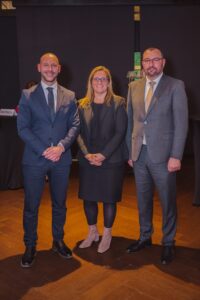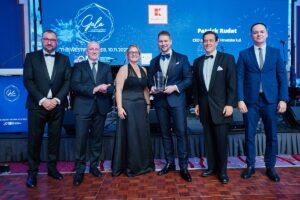Our network in Croatia currently counts more than 340 companies with over 113,000 employees.
Last year, AHK in Croatia celebrated 20 years of work. AHK has grown into the largest foreign chamber of commerce in Croatia. With the director Mrs Stefanie Ziska, we talked about the plans they have but also concrete projects, such as “green hydrogen”. Director Ziska also announces the German-Croatian Economic Forum under the motto “The future of Croatia” in May.

- At the end of last year, the AHK celebrated its 20th anniversary in Croatia. As director and team leader, what are you most proud of in your work and what has AHK achieved?
Over the past 20 years, AHK Croatia has developed into the largest bilateral business association in Croatia. The AHK offers a comprehensive range of networking and specialist events and services for market entry in both countries. With over 50 events a year and more than 2,000 participants, our AHK is certainly one of the most active bilateral business organizations.
There have been many milestones: During this time, the AHK has developed into an important market player in the energy sector with a focus on renewable energies and energy efficiency. Back in 2006, we organized our first major conference on this topic with over 250 participants. This was one of the first conferences of this sort in Croatia. From 2015 to 2022, we focused on the topic of dual training based on the German model: Here, among other things, we were able to help introduce the dual seller at a national level and create an understanding of vocational training among government bodies to strengthen the supply of skilled workers. We have organized numerous business forums and delegation trips with political participation, awarded innovation and business prizes to companies, supported start-ups in their internationalization, assisted numerous companies in entering the market and founding companies in Croatia. We are the first point of contact for questions about the Croatian or German market and have created a comprehensive nationwide network of partner institutions.
- In times of crisis, the development of AI and new technologies, when energy dependency dictates development trends, where do you see an opportunity for German companies in Croatia?
The last few years have shown that it is very hard to predict anything. First COVID, then the Russian aggression in Ukraine, the war in Gaza, now the Red Sea crisis…We live in quite uncertain times.
As ever, our aim here at the AHK is to draw as many investors to Croatia as possible. I am so happy that Croatia joined the Eurozone and Schengen as this is another push for serious investors. Since nearshoring strategies are still on the rise, we see a lot of opportunities for German entrepreneurs in Croatia in greenfield or brownfield investments in the “classic” industries, whether in mechanical engineering, metal processing or in sectors such as automotive, chemicals & pharmaceuticals and electrical engineering. Croatia already has some good examples of best practice in the investment area. There are many opportunities in niches in particular; Croatia is not a market for mass production. Competitive production is possible in many high-tech industries, for example in the automotive sector. Our members include several “hidden champions”, German investors who have been successfully producing for the global market in Croatia for many years. For example, Formula 1 racing cars run on tires produced on “made in Croatia” heating presses. Police officers and firefighters all over the world wear safety shoes made in Croatia.
IT, of course, is high on the priority list. We have been contacted by several German companies from that field. I could even say that lately the most serious inquiries from Germany came from the IT industry. Energy is high on the list as well. Worth mentioning is that Croatia must invest several billion in climate protection by 2050 to mitigate the consequences of climate change and make the economy more climate neutral. This will affect a number of industries and is certainly an opportunity for German bidders to get involved. The combination of German technology and Croatian resources would be a win-win situation. There have been some great examples lately of such cooperations.

- What are the most common problems that investors and companies face and how do they solve them when they want to start a business in Croatia?
The most common problems when making business in Croatia have been the same for years. They are clearly stated in our annual economic survey. The most prominent issue is the insufficient fight against corruption, which continues to be a significant concern. Entrepreneurs also regularly identify tax burdens, complexities within the tax system, challenges with public administration, and the lack of transparency in public procurement processes as key disadvantages. The challenge of skilled labor shortage is also a prominent issue. Governments and businesses are working together to find solutions, including investing in education and training. Our AHK has been strongly involved in these activities with the afore-mentioned education projects. The latest project in this field is our “Female Engineer of the Year” with the goal to put female engineers in the spotlight and motivate young girls to choose a career in STEM.
However, despite the problems faced by companies, more than 80 percent of surveyed companies are ready to invest in Croatia again. This positive indicator signals a consistent level of willingness to reinvest in Croatia, matching the sentiment observed in both 2021 and 2022. Notably, Croatia holds a respectable 5th position among the 16 countries in Central and Eastern Europe in terms of its attractiveness as an investment destination.
Several factors contribute to Croatia’s appeal to investors. Membership in the European Union, a skilled workforce, quality higher education, prompt payment practices, adequate infrastructure, productivity levels, and employee dedication to achieving better results are highlighted as positive aspects of doing business in Croatia.
- Over time, the AHK has developed into an important market player in the energy sector with a focus on renewable energies and energy efficiency. How do you see the wider relationship between the two economies?
From 2007 to 2023, AHK Croatia organized 22 delegation trips on the topic of renewable energy sources as part of the German Energy Solutions initiative. These trips had a significant impact on creating business cooperation and partnerships among industry leaders. Such projects were an ideal platform for exchanging know-how and professional practices between Germany and Croatia, as well as encouraging cooperation in that industry. AHK Croatia has been implementing two significant projects on energy efficiency for several years: Eurem and Young Energy Europe. These initiatives represent essential components of the organization’s efforts to promote sustainability and facilitate knowledge sharing within the energy sector. Through Eurem, AHK Croatia offers training programs designed to enhance the skills of professionals in energy management, enabling them to implement effective energy-saving measures. Similarly, Young Energy Europe focuses on the younger professionals, providing educational initiatives to inspire future leaders in energy innovation. Together, these projects highlight AHK Croatia’s important role in advancing the transition towards a more sustainable and energy-efficient future.

- Given the German focus on green hydrogen, how do you assess the opportunities for cooperation?
Hydrogen is set to play an important role in the country’s energy, transportation and industrial sectors. Thanks to a good starting position in energy generation from renewable energies, green hydrogen is to be produced in a climate-friendly way. According to the hydrogen strategy, hydrogen could account for between 20 and 30 percent of Croatia’s gross energy consumption by 2050.
Some Croatian companies have already started to examine the integration of hydrogen into their business models and have launched their first pilot projects. For example, INA’s first commercially operated hydrogen filling station could go into operation by 2025. The City of Zagreb is also conducting a pilot project for hydrogen use in local public transport with INA involvement. As a result of the project, 20 hydrogen buses could be procured and used in the capital in a few years’ time.
HEP, which plans to increase its electricity generation capacity by 1,500 megawatts by 2030, is also looking into making greater use of hydrogen. Electricity production from renewable energy sources is set to increase from 6 billion to 9 billion kilowatt hours per year. This capacity could also be used for the production and use of hydrogen.
At a national political level, the long-term supply of gas and hydrogen to Germany and Austria from the Croatian LNG terminal on the island of Krk was discussed. A joint steering group is now to clarify the next steps with network operators and energy suppliers over the coming years. There are generally good opportunities for bilateral cooperation here.
- What are AHK’s plans for this year, what would you like to highlight from your activities for our readers?
Every year, we organize a range of events and initiatives that interest foremost our members but also the public and institutions. A good example is our upcoming delegation trip to Munich, that will comprise the themes of hydrogen, e-mobility, and artificial intelligence. This project will provide insights but also strong networking opportunities for participants and enable them to explore advancements in these fields.
Furthermore, our calendar includes the German-Croatian Economic Forum under the motto “The future of Croatia” in May. We are still deciding on the program, as there are so many interesting and important topics but too little time.
When making plans we always try to listen to our community, our members mainly, and then focus on what their needs are. Recently we organized a workshop about the professional use of ChatGPT, for example, and the interest was enormous. Apart from our networking events there will be further expert seminars depending on current topics in the market. We always try to introduce our members to new and interesting speakers and professionals to support them in being up to date with everything important for their businesses.
The year end is reserved for our traditional annual Gala evening. Last year we had almost 300 guests. This might sound pretentious, but I think our AHK Gala is one of a kind in Croatia. You must come and see for yourself.